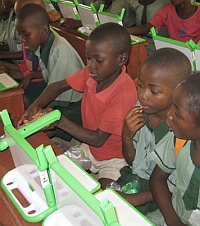As of right now, I'm typing this up on my laptop, finding research information on the Internet and you are reading this over the Internet. In my own experience as a college student, technology plays a huge role in my academic life. I couldn't imagine not having the endless wealth of information that is the Internet at my disposal or having the indispensable piece of technology that is my laptop. These technologies provide a huge advantage to me educationally and sadly most of my counterparts in developing countries are not fortunate enough to enjoy the educational benefits of these technologies. There exists a huge discrepancy between the technologies available to citizens in developed countries and the ones available to citizens in developing countries. This gulf has been labelled by observers as the "global digital divide" and it has had an especially profound influence in the fields of educational access and quality of education. The uneven distribution of Internet accessibility across the world points to a increasingly wide gulf between the world's "information-rich" and "information poor". A 2002 World Economic Forum investigation into the "global digital divide" found that "88% of all internet users are from industrialized countries that comprise only 15% of the world's population."
 |
| One Laptop Per Child in Nigeria |
Another crucial area which is calling for improvement is Internet accessibility in the developing world. One of the premier organizations committed to furthering Internet accessibility in the developing world is the New Partnership for Africa's Development E-School Program, which aims to provide computer and internet access to all schools in Africa within 10 years. The program is one of the most ambitious initiatives of its kind and is especially crucial for a continent in which 40% of the population is 15 years old or younger. The world is becoming more and more technologically complicated and this current generation of young Africans is at risk of falling behind. This could lead to a "lost generation" of sorts, out of touch and inexperienced with technology and thus suffering from a major disadvantage in the global job market and lower standards of living arising from lack of technological education. More programs like the NEPAD E-School program are needed all around the developing world to ensure that children all over the world have an equal opportunity to succeed as their counterparts in industrialized nations.
I'd like to close this article with a little anecdotal interlude into my own experiences as an Sudanese immigrant coming to the United States. I have been afforded with a great amount of opportunities, educational and otherwise, that people in Sudan and other impoverished countries are not fortunate enough to enjoy. What sets me apart from my less educated cousins and countrymen isn't how smart or talented I am because I've seen a lot of kids a lot smarter than I am having their potential wasted because no one has given them the kinds of opportunities their brilliance deserves. What sets us apart is the quality and number of opportunities that have been given to us and so it is of fundamental importance that efforts be made in order to bridge the gap and give all children everywhere an equal opportunity to succeed. I think that the way we can do that is through improving access to and quality of education and education technology. The future remains to be seen but for now the first step is recognizing this problem and making an effort to try and solve it.
To serve as a comparison between the attitudes towards technology and education in America and the developed world I have included a brief interview I had with my English teaching assistant on her thoughts on technology use in classrooms below:
Sources:
http://www.eafricacommission.org/about-us
http://www.laptop.org/en/
http://h41147.www4.hp.com/emea_africa/en/partners/nepad/index.html
http://en.wikipedia.org/wiki/Global_digital_divide
No comments:
Post a Comment